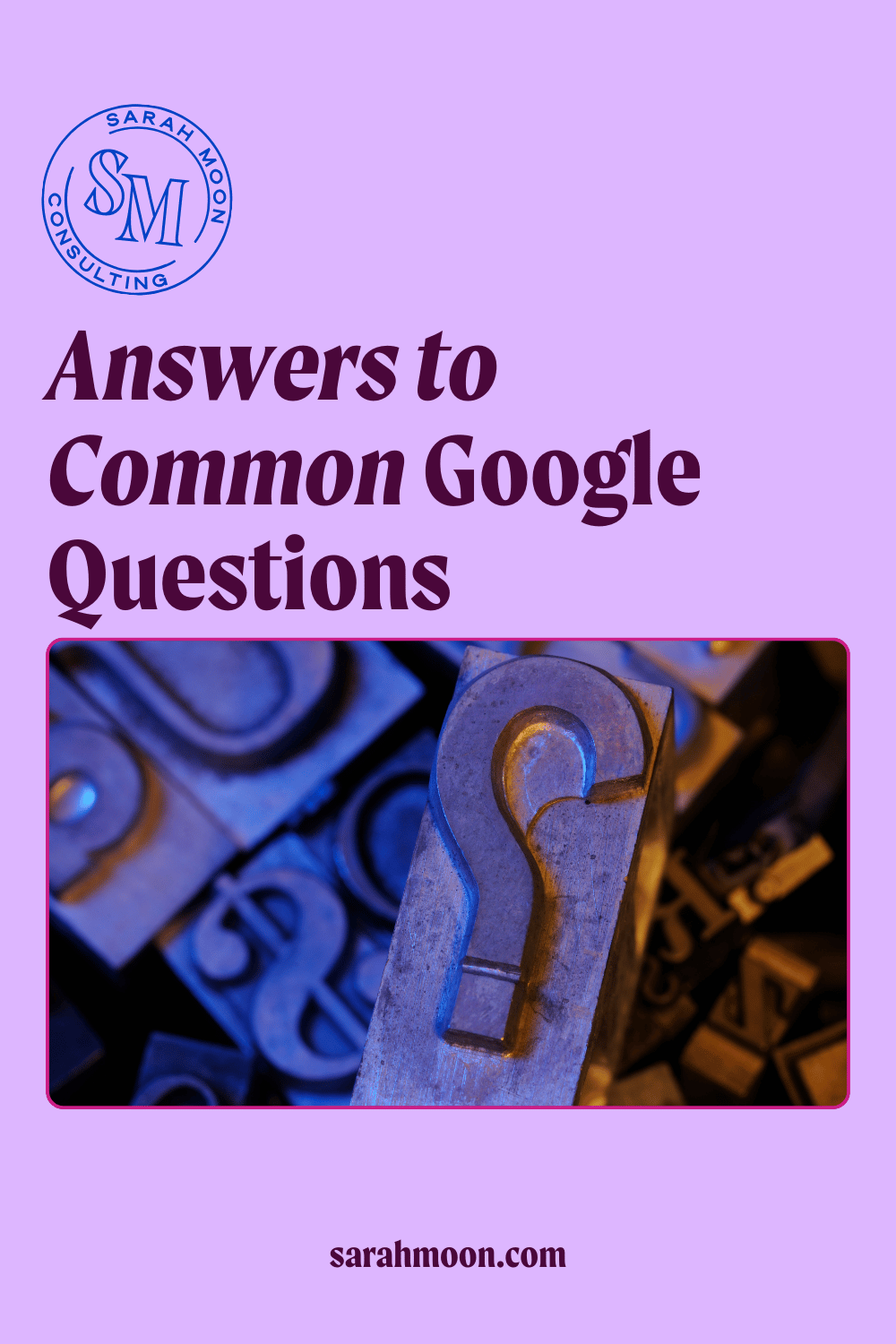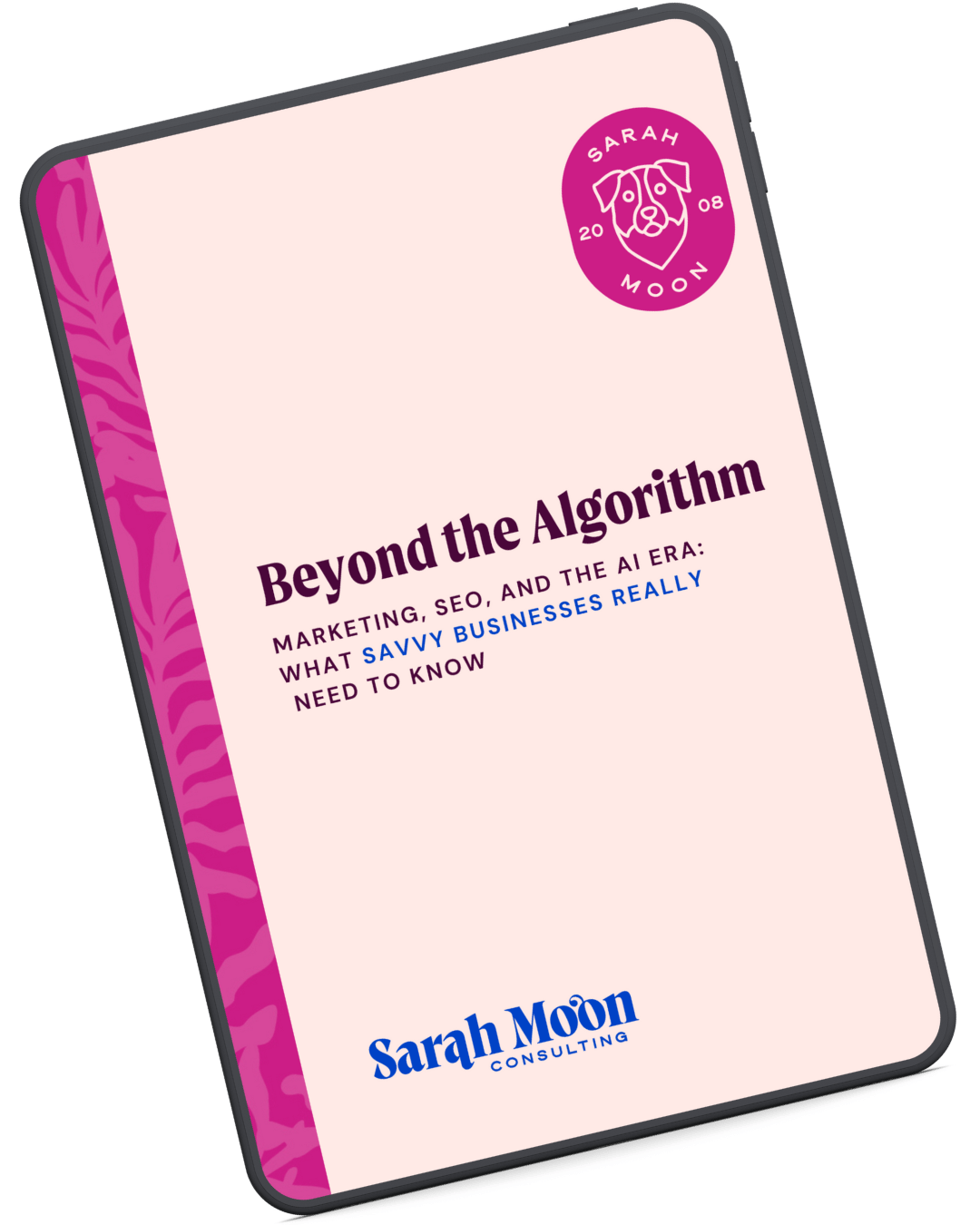Three Simple Answers to Common SEO/Google Questions
I probably say this once a day: Google is weird!
It's true; Google is super-duper weird and full of quirks. (This is why we tend to use more "evergreen" Google search strategies.)
Unsurprisingly, I get a lot of questions from clients that can be attributed to all this weirdness (technical term). And while there is plenty in the world of digital marketing that we can shrug our shoulders about and leave low on the priority list, search engine optimization and Google search results are probably not one of them. When we either overlook the oddities or spend an inordinate amount of time obsessing over them, we're sacrificing time better spent working with clients, marketing our services, or creating new ideas.
So, here are some of the most common questions I hear and answers! I hope this will demystify a few common Google questions you may have.
Why do certain pages show in my Google search preview (aka Site Links)?
Do you know those previews of pages in your site structure in the search engine? They look something like this:
Those structural previews in Google are generated by bots. Oftentimes, we receive emails from potential clients wanting to fix odd site link results in the search engine. But the answer is more complicated than you'd guess.
In the past, you used to be able to demote (for lack of a better word) them in Google Search Console, but at some point, that option disappeared. So, website owners have little direct control over what appears in site links.
However, you can do a few things to nudge Google in the right direction:
Have a multi-level navigation
Link pages together that are related
Use your target keywords smartly so Google understands what your pages are about
No-index administrative pages like privacy policies and thank you pages to prevent them from appearing in site links (this is very common)
Fortunately, the solutions to this weirdness are all things that generally make your website more friendly to Google and, more importantly, people.
Why did Google change my page titles and descriptions?
This is the weird Google thing that drives me bananas—you're not alone!
Case in point: Google has decided that, for some reason, my homepage is named “Sarah Moon.” This is fine because that is my name, but my company is "& co," and that’s also not what the homepage is named. (Fortunately, this is annoying and not a marketing factor because the homepage is intentionally not the primary “door” people come in to discover us.)
Last I checked, Google is rewriting about 60% of page titles across search results.
This means that the page titles you wrote may be replaced by something else on your page or—and this is when it really stinks—something completely random. In the second case, it’s definitely a situation you must dig into and address. In the case of the first, it’s usually something reasonable, like using the first header on your page.
(Fun story: The weirdest one I ever saw was Google replacing someone’s page title with some hashtags from their Instagram feed because they had little written content on their page. The solution was more words and proper heading structure.)
I've also observed that general titles (ie, "About" or "Services") get rewritten more than detailed ones such as "Website Design & Development Services." Basically, Google rewards clarity and specificity.
Why doesn’t Google just use the titles you’ve written?
Because more people than you’d think write page titles that aren’t related to the content. (I have seen some wild stuff!)
Your header 1 is more clear than your title tag.
Google is trying to match the searcher intent to the titles.
Google thinks your titles are too long/too short.
Repetitive titles or outdated titles.
Google is weird. (Couldn't resist.)
The solution? Be specific in your use of title tags, use your keywords smartly, and make sure your titles and your content connect in a logical manner. (Think like a human!)
By the way, writing this made me notice that some of my site descriptions have been rewritten very recently in Google, so I will address that in the coming weeks.
Why have my rankings in Google dropped, or why am I suddenly ranking for new keywords?
What Savvy Business Need to Know about SEO
Get your free copy of Beyond the Algorithm–Marketing, SEO, and the AI Era. In this ebook, I bring you a level-headed, research-based approach to understanding visibility in Google and beyond in an approachable, practical way.
I cannot tell you how many of my ask me anything-style strategy calls I’ve done with folks who were ranking highly in the search engine for ages and then suddenly... are not.
That’s because Google changes all the time. Sometimes small adjustments, sometimes massive ones.
(Though none are as severe as Instagram updates, for sure.)
In 2020, a very chaotic year, Google made around 4,500 updates to the search engine. Another time, huge numbers of sites that referenced dietary supplements were caught in an update intended at whacking scam sites (which was a good thing, it just stinks that innocent sites were harmed in that update).
Now, lest you think I want you to play wack-a-mole with the search engine, this does not mean you need to keep up with every change that’s ever happened. Please don't try! That would be frustrating and fruitless. And not at all strategic. And we love strategy!
What it means is that you should monitor trends on your own website (check out Andrea’s article that digs into this in-depth) and adjust before you have to make massive corrections.
Note what's rising in popularity and what's slowly dropping. Do you need to refresh content, clarify headers, and improve your internal links? This is basic maintenance that will serve you in the long run.
We also encourage our clients to lean into an evergreen search strategy based on content that has a long lifespan, is update-able and repurpose-able. This is the approach we've used in Google for years and is the primary source of our business growth. It's not set it and forget it, but it is manageable.
The next time you think something is flat-out wrong with your website's appearance in Google, don't panic! Spend some time digging a little deeper into your SEO panel and see if you can figure it out using some of these insights.
If not, understand that Google is most definitely weird and that you don't have to know everything related to the search engine. As always, you can reach out to our team for help with your SEO strategy (creating a new one or revising the one you have) or interpreting your analytics in a way that helps you see the growth opportunities.








Did your Google Business Profile lose its Q&As? Here's why and how to mitigate this change.